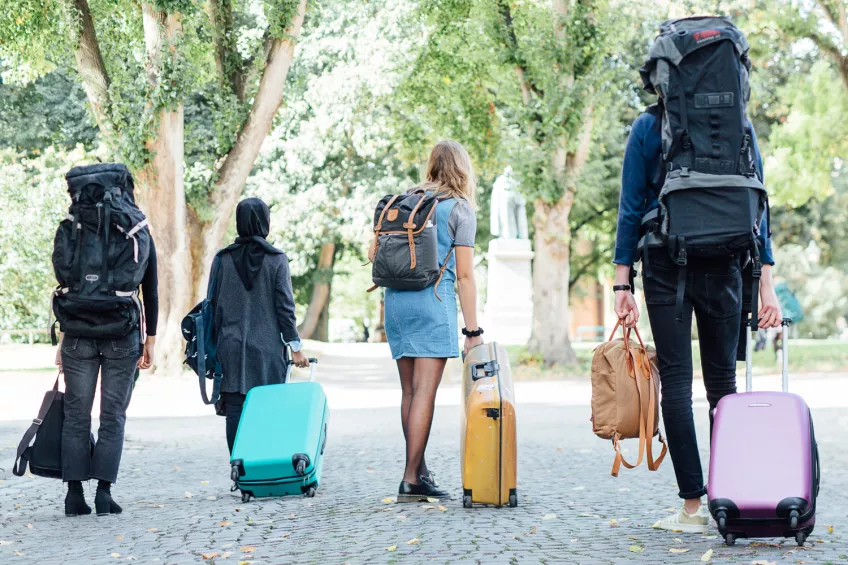Course, webinar and workshop for students going abroad
Whether you are going to your destination country for a traineeship, fieldwork or exchange, you will find yourself in unfamiliar situations. To help you prepare, we have put together a 'preparation pack'.
Travelling and living abroad is a learning process. It involves putting yourself in new situations, daring to ask 'silly' questions when you don't have all the answers, getting to know new people and learning more about yourself.
Reflecting on your experiences gives you a deeper understanding of yourself, your approach to the world around you and how you interact with it. This will benefit you in both the short and long term.
Contact information
International Desk
Email: studentreception [at] lu [dot] se (studentreception[at]lu[dot]se)
Telephone: +46 (0)46 222 01 00
Get ready for a new country and culture
To help you to prepare as well as possible for your stay abroad, we have developed a 'preparation pack' consisting of
- an online course (about 60 minutes)
- a short video (about 6 minutes)
- a webinar with current exchange students
- a risk impact and probability analysis template
- a risk impact and probability analysis workshop (about 90 minutes).
Find out more about these different parts below.
'Get prepared for your departure' is a digital course that prepares you for various aspects of your stay abroad.
The course consists of six different modules:
- Cultural Competence
- Moral Awareness
- Prepare, Be Aware: Your Personal Safety
- How to be a Good Ambassador
- Sustainable Development Goals
- Safety and Medical Advice (for low and middle income countries)
Each module ends with a short quiz. You must answer all the questions correctly before you can move on to the next module. You can pause the course and return to it later.
Start the 'Prepare for your departure' course in Canvas
'Get prepared for your departure' is based on the 'ReadySetGo' online course. While the material was originally developed for medical students going abroad, it is equally relevant to other students in a similar situation.
'ReadySetGo' was developed in collaboration with
- Uppsala University
- Umeå University
- Linköping University
- Örebro University and
- University of Gothenburg
as a project within the NIMUS network, which promotes the internationalisation of medical education in Sweden.
Arriving in another country where things are new and different is often fun and exciting. But it can also be challenging. The Student Health Centre has produced a video with information and tips on what you can do to make the adjustment as smooth as possible:
The 'Meet the experts' webinar gives you the opportunity to meet students who are currently on exchange somewhere in the world. Over the course of an hour, you will hear brief descriptions of their daily lives. They will also share advice they wish they had received before they left. You will also have the opportunity to ask them your own questions in a Q&A session.
The webinar is offered each semester, in November and April. Invitations are sent by email to students who have been nominated for exchange studies for the following semester.
Conducting a risk impact and probability analysis before you leave is a good way to prepare, whatever your destination. Being prepared will help you deal with challenging situations when they arise.
Carry out your own risk impact and probability analysis using the template below. Then bring it to the workshop on risk analysis (see below). Note that it does not need to be completed before the workshop.
In the risk impact and probability analysis, focus on the following points
- Identify major and minor risks (serious incidents) that you may face during your stay abroad. Discuss them with others.
- Estimate the likelihood of each risk occurring.
- Estimate how serious the consequences could be (more or less serious).
- Think about how you could deal with the situation or avoid it altogether.
- Consider how you could minimise any damage that might occur.
Download the template 'Risk analysis before travelling' (PDF 165 kB, new tab)
The workshop on risk analysis is offered in November and May.
The workshop is based on discussions with other outgoing students. As a starting point, you should have completed the online course 'Get prepared for your departure'. You should also have started a risk impact and probability analysis using the template above.
Your risk impact and probability analysis does not need to be completed in advance. You will be able to develop your reflections through discussions with other students during the workshop.
Outgoing students will receive an email with the date, time, venue and registration information.
High-risk countries
Some countries are considered to be inherently more risky than others. Staying in one of these countries can significantly increase the risk for visitors. Examples include poor countries or countries that don't respect human rights and academic freedom.
Regions of a country can sometimes differ from the rest of the country in terms of security.
Lund University does not have a list of high-risk countries. However, a number of organisations regularly produce descriptions of countries and conflict areas. You can use these to form your own understanding and opinion.
- Descriptions of conflicts by country in Uppsala Conflict Data Program – ucdp.uu.se
- ILGA World, mapping sexual orientation and LGBTQ legislation – ilga.org
- 'Country guide' (Swedish: 'Landguiden') by The Swedish Institute of International Affairs – ui.se (in Swedish)
- Travel information by the Swedish Government – regeringen.se (in Swedish)
Among other things, fieldwork may require extra caution if the destination country violates internationally recognised values and principles.
Examples include
- human rights as defined by the UN
- the principle of the rule of law
- academic freedom
- independence of the individual and the institution from the state.
In these contexts, several indices can be useful for risk analysis:
Get in touch with other outgoing exchange students
Through the Goin’ Abroad Network, you can discover who else is going on exchange to the same university/country as you are! Start building your network to make the transition to life as an exchange student smoother.
You will receive an email with an invitation to the Goin' Abroad Network in November or April (depending on the semester).

Follow students abroad on Instagram
You can follow students who are abroad for an exchange, traineeship or data collection.
Follow @lund_university_abroad
Contact us if you would like to become a future student ambassador on Instagram.
Email: lunduniversityabroad [at] er [dot] lu [dot] se (lunduniversityabroad[at]er[dot]lu[dot]se)
